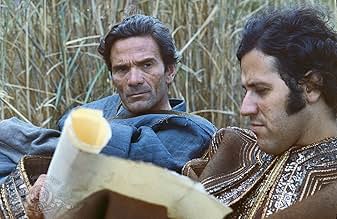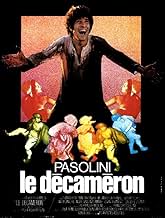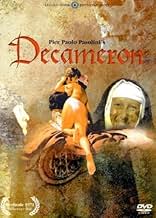ÉVALUATION IMDb
7,0/10
13 k
MA NOTE
Une adaptation de neuf histoires du « Décaméron » de Boccace.Une adaptation de neuf histoires du « Décaméron » de Boccace.Une adaptation de neuf histoires du « Décaméron » de Boccace.
- Prix
- 1 victoire et 3 nominations au total
Jovan Jovanovic
- Rustico
- (scenes deleted)
Maria Gabriella Maione
- Una madonna
- (as Gabriella Frankel)
Pier Paolo Pasolini
- Allievo di Giotto
- (as P.P. Pasolini)
Histoire
Le saviez-vous
- AnecdotesIl Decameron (1971) is the first film in Pier Paolo Pasolini's "Trilogy of Life," continuing with I racconti di Canterbury (1972) and concluding with Il fiore delle mille e una notte (1974). Each film was an adaptation of a different piece of classical literature focusing on ribald and often irreligious themes. The tales contain abundant nudity, sex, slapstick and scatological humor.
- GaffesWhen the Mother Superior seduces the deaf-mute boy, he's sleeping in a tomato garden. Tomatoes are a New World crop that wouldn't be brought to Italy for another two centuries. The same is true of the corn (maize) growing in the convent's little field.
- Citations
Allievo di Giotto: Why create a work of art when dreaming about it is so much sweeter?
- Autres versionsAlthough the cinema version was intact the 1988 UK Warner video was cut by 22 secs by the BBFC to remove shots of naked genitals during the bedroom sex scene with the nun. The cuts were fully restored in the 2001 BFI DVD release.
- ConnexionsEdited into Porno & libertà (2016)
- Bandes originalesFenesta Ca Lucive
Written by Guglielmo Cottrau, Vincenzo Bellini and Giulio Genoino in 1842
Performed by Franco Citti
Sung by Ser Ciappelletto and his Neapolitan hosts in Germany. Also sung by one of the Neapolitans to a monk.
Commentaire en vedette
Pier Paolo Pasolini has with the Decameron what is supposedly one of his "happiest" movies. This is not to say the film is always cheery- matter of fact a couple of the stories deep down are pretty dark and sad and cursed thanks to the repression of religion and mortal sins- but Pasolini's comedy here is sharp and his wit comes out in the obscene or in the random. It's a little like Bunuel only with a more earthy sensibility with the locations and slightly less surreal situations; it doesn't mean that Pasolini is any less ambitious with treating the foibles and stringent ways of the Catholic Church.
The Decameron's only big liability, in my estimation, is that it could be easy to get lost in the structure Pasolini sets up; it's nine stories, ranging from a Sicillian being swindled after finding out he's a brother to a sister of royalty until he's covered in feces, to a supposedly deaf-mute boy who becomes the sex toy for a bunch of sex-starved nuns, to a supposed 'Saint' who fools a priest into thinking he's such with his lackluster confessional, to a girl being met by her boyfriend on the roof and then being (joyfully) caught by her parents since his family is wealthy. They're all interesting stories, more often than not, with even a really short piece like the priest attempting to seduce his friend's wife providing something amusing or eye-catching visually.
But, again, all of these stories go from one into the next without much warning, and one may wonder when the next story really begins or if it's a continuation of the last. As it turns out, like the Phantom of Liberty, it's very stream-of-consciousness and one skewering of morality and sex can bleed easily into the other. And yet some may find this to be a more daring strength than others; certainly it's a very funny movie (if not quite as funny as Pasolini's masterpiece The Hawks and the Sparrows), like with the bit of the guy caught in the tomb, to the frankness of the parents asking the boy to marry their daughter on the rooftop - even just the strange feeling one gets watching the painter (played by, I think, Pasolini himself) in the act of creating an unusual but unique work on a church wall.
The greatest thing of all, for fans of the subversive, is that nothing is out of bounds for Pasolini, via his source material of the Boccaccio book, and he never is one to ever shy away from sex. That's also another asset this time around- unlike Arabian Nights we get some actually erotic bits thrown in the midst, if unintentionally, and on occasion (i.e. the shot following Lorenzo as he runs by the fence) the director conjures something powerful amidst the medieval/surreal/neo-realist pastiche. 8.5/10
The Decameron's only big liability, in my estimation, is that it could be easy to get lost in the structure Pasolini sets up; it's nine stories, ranging from a Sicillian being swindled after finding out he's a brother to a sister of royalty until he's covered in feces, to a supposedly deaf-mute boy who becomes the sex toy for a bunch of sex-starved nuns, to a supposed 'Saint' who fools a priest into thinking he's such with his lackluster confessional, to a girl being met by her boyfriend on the roof and then being (joyfully) caught by her parents since his family is wealthy. They're all interesting stories, more often than not, with even a really short piece like the priest attempting to seduce his friend's wife providing something amusing or eye-catching visually.
But, again, all of these stories go from one into the next without much warning, and one may wonder when the next story really begins or if it's a continuation of the last. As it turns out, like the Phantom of Liberty, it's very stream-of-consciousness and one skewering of morality and sex can bleed easily into the other. And yet some may find this to be a more daring strength than others; certainly it's a very funny movie (if not quite as funny as Pasolini's masterpiece The Hawks and the Sparrows), like with the bit of the guy caught in the tomb, to the frankness of the parents asking the boy to marry their daughter on the rooftop - even just the strange feeling one gets watching the painter (played by, I think, Pasolini himself) in the act of creating an unusual but unique work on a church wall.
The greatest thing of all, for fans of the subversive, is that nothing is out of bounds for Pasolini, via his source material of the Boccaccio book, and he never is one to ever shy away from sex. That's also another asset this time around- unlike Arabian Nights we get some actually erotic bits thrown in the midst, if unintentionally, and on occasion (i.e. the shot following Lorenzo as he runs by the fence) the director conjures something powerful amidst the medieval/surreal/neo-realist pastiche. 8.5/10
- Quinoa1984
- 19 oct. 2008
- Lien permanent
Meilleurs choix
Connectez-vous pour évaluer et surveiller les recommandations personnalisées
- How long is The Decameron?Propulsé par Alexa
Détails
- Date de sortie
- Pays d’origine
- Langues
- Aussi connu sous le nom de
- The Decameron
- Lieux de tournage
- sociétés de production
- Consultez plus de crédits d'entreprise sur IMDbPro
Box-office
- Brut – à l'échelle mondiale
- 839 $ US
- Durée1 heure 51 minutes
- Mixage
- Rapport de forme
- 1.85 : 1
Contribuer à cette page
Suggérer une modification ou ajouter du contenu manquant

Lacune principale
By what name was Il Decameron (1971) officially released in Canada in French?
Répondre



























